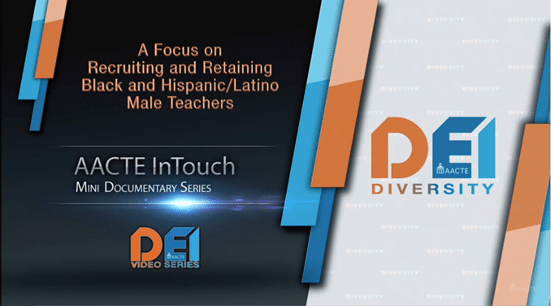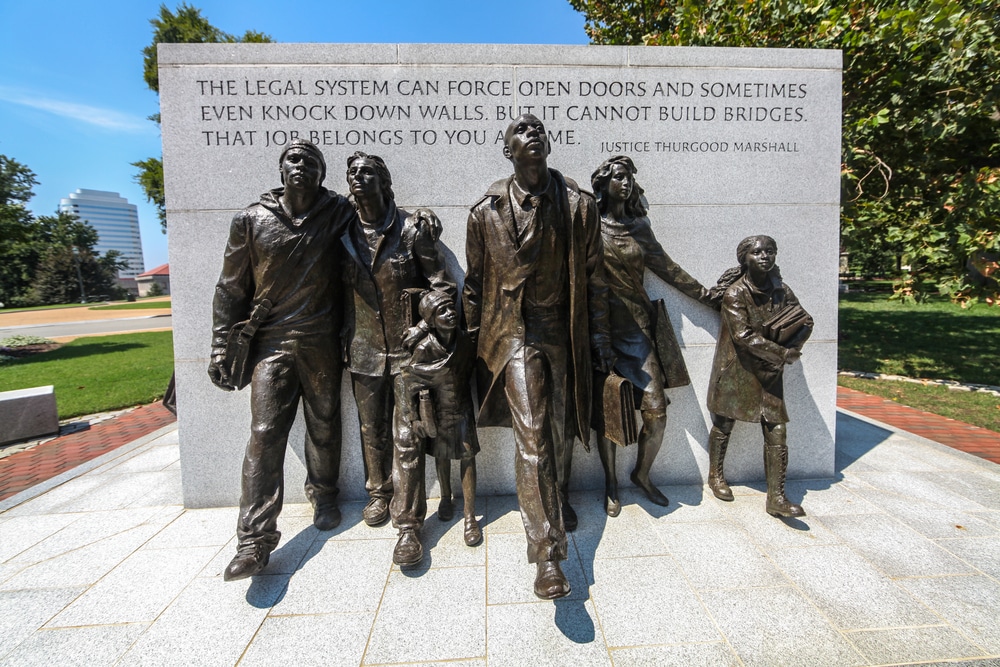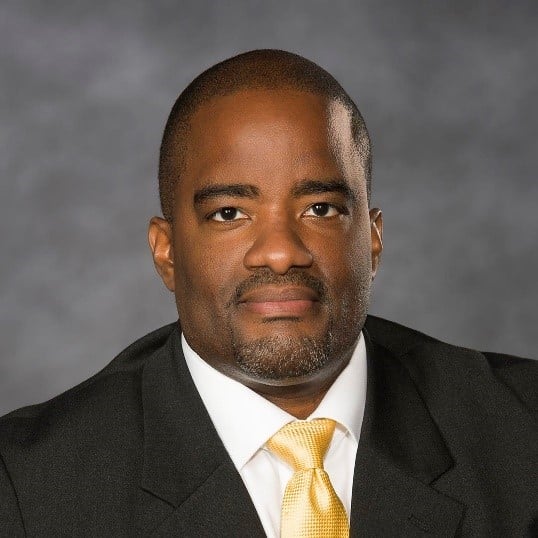10 Jul2020
AACTE DEI Video: A Focus on Recruiting and Retaining Black and Hispanic/Latino Male Teachers
By Jerrica Thurman

Ed Prep Matters features the “Revolutionizing Education” column to spotlight the many ways AACTE, member institutions, and partners are pioneering leading-edge research, models, strategies and programs that focus on the three core values outlined in the current AACTE strategic plan: Diversity, Equity, and Inclusion; Quality and Impact; and Inquiry and Innovation.
During this segment of the Diversity, Equity and Inclusion video series, AACTE members who participated in a 5-year study discuss their findings on ways to increase representation of men of color into the teaching profession. In “A Focus on Recruiting and Retaining Black and Hispanic/Latino Male Teachers,” researchers share the collective approaches campus-wide and across generations and disciplines required to effectively diversify the teacher pipeline.
02 Jul2020
By Jacqueline Rodriguez

In collaboration with national experts including AACTE, Phi Delta Kappa International (PDK) has released a Blueprint to Establishing a Place-Based Grow Your Own Program to support growth in the teaching profession. According to PDK, “Grow your own programs recruit students from their current high school population to enter educator pathway programs. Districts and states then partner with local educator preparation programs to offer enrollment incentives to students, keeping them close to home so that they will return as teachers to the classrooms where they currently learn.”
As our nation’s schools are increasingly diverse, our teaching workforce must reflect the communities in which they serve. This step-by-step Blueprint provides the context and the guiding principles to support local leaders who seek to grow their own teaching pool from within their diverse eco-system.
02 Jul2020
By Jacqueline E. King, Ph.D.
The AACTE Board of Directors recently created two new advisory committees to promote diversity in the educator workforce and among future leaders and scholars in educator preparation. These committees will be an integral part of fulfilling the strategic priority of diversity, equity, and inclusion outlined in AACTE’s strategic plan.
Advisory Committee on Educator Diversity
The purpose of this committee is to advise the AACTE staff and Board of Directors on current trends, issues, and programming needs related to advance diversity in educator preparation program faculty and candidates. The committee shall provide recommendations and feedback for program improvement that may pertain to the following:
26 Jun2020
By Rodney Robinson
This article originally appeared on Rodney Robinson’s blog and is reprinted with permission.
Yesterday, I woke up to a country and a city in crisis. I had text messages from former students who are now in their late 20’s looking for guidance and advice. Teachers who are close friends and some strangers have asked for my advice on what they should be doing. I did my best to calm their fears and try to help them channel their anger, anxiety, and aggression into a more impactful way but soon became overwhelmed at the sheer hopelessness of the situation. Like everyone, I’ve been sulking and processing the events of the past week.
Politicians, the media, and pundits love to use the term systemic racism to describe what is going on to generalize the problems of being black in America. While this is true, we must address the causes of systemic racism and not allow them to generalize and describe the system they are complicit in maintaining. We must push them to make systemic racism more than a buzzword. We must push them to define systemic racism and demand solutions that provide actionable change and implementation which most aren’t willing to do because they must sacrifice their comfort and position.
Peaceful protests and uprisings are not inspired just from the frustration of a lynched unarmed Black man. This is the frustration that comes from an inherently racist society that was built to subjugate Black people. According to Ta-Nehisi Coates, the “destruction is merely the superlative form of a dominion whose prerogatives include frisking, detainings, beatings, and humiliations.” It also comes from lack of safe, affordable neighborhoods, an education system that punishes black and brown boys and girls at rates 3-4 times higher than white kids, and a criminal system that stalks and preys on black bodies limiting their opportunities for physical and financial freedom.
25 Jun2020
By Leslie T. Fenwick

This essay is excerpted from Leslie T. Fenwick’s forthcoming book, Jim Crow’s Pink Slip: Public Policy and the Near-Decimation of Black School Leadership after Brown. The excerpt provides a brief history about how many public schools came to be named for confederates and racist politicians who fought against integration and illegally resisted the Brown decision.
In 1954, the Brown v. Board of Education legal decision proclaimed that segregation had no place in America’s public schools. With this new law of the land and ensuing federal pressure to desegregate, school districts in 17 dual system states complied by closing black schools and firing, demoting and dismissing legions of exceptionally credentialed black principals and teachers. At the time, closing black schools was the primary method for ridding the system of black principals and teachers most of whom were better credentialed than their white peers. Directly after Brown there was little displacement of black principals and teachers, but as Title VI compliance mandates increased, the National Education Association (NEA) received reports from black teachers’ associations indicating that displacements were increasing.
In late 1969, C. J. Duckworth who served as executive secretary to the Mississippi Teachers Association clarified the link between black school closures and black principal firing and demotions in 17 Mississippi school districts. In his report to the NEA, he wrote:
Alcorn County – the black high school reduced to a junior high school and the black principal demoted to a federal projects coordinators; Clarke County – the black high school reduced to a junior high school and the principal made an elementary principal for remainder of the year, after which he was to be terminated; Clay County – the black high school reduced to a junior high school with a white principal; ….Franklin County – a black elementary principal replaced by a white principal; Hancock County – the black high school phased out and only two of 10 black teachers remain; Harrison County – a black junior-senior high school eliminated and the black principal made supervisor of a material center;….Itawamba County – all black schools and principals eliminated; ….Prentiss County – black high schools and principals phased out; ….Marion County – black high school principals replaced with whites…. (p. 5332)
25 Jun2020
By AACTE

AACTE celebrates the recent rulings of the Supreme Court of the United States (SCOTUS) in support of the LGBTQ community and the Deferred Action for Childhood Arrivals (DACA) program. AACTE commends the two decisions and their significant impact for growing a diversified educator workforce prepared by AACTE member institutions to meet the needs of diverse learners.
For the first time in American schools, LGBTQ teachers will not fear the loss of employment when self-identifying thanks to the SCOTUS June 15 ruling. It affirms the 1964 Civil Rights Act protects gay, lesbian, and transgender employees from discrimination based on sex. AACTE believes representation of LGBTQ educators in schools is vital to the mental and physical health of LGBTQ students, particularly Black transgender youth. The SCOTUS decision will increase the visibility of gender diverse teachers on all levels of the education system and will help students gain a deeper understanding about the LGBTQ community.
22 Jun2020
By Jacob Easley II
 This article originally appeared on the Graduate School of Education at Touro College website and is reprinted with permission.
This article originally appeared on the Graduate School of Education at Touro College website and is reprinted with permission.
To the Touro GSE community, our candidates, and in particular, the youth and children we serve by way of our educator preparation programs, I write to you in solidarity with the many educators across the United States who collectively speak out against the horrific brutality and the death of George Floyd and many others. The world is watching. These are indeed troubling times coupled with the COVID-19 pandemic.
Our president of Touro College and University System, Dr. Alan Kadish has led the charge for those of us within the Touro academy to “Be part of the solution.” To our Black and brown youth, our first desire is your safety and to let you know you are valued. This too we hold dear for all communities of color. Yet, desires without actions are delusions. We must also move beyond rhetoric and engage the tools of professional educators. This we must and will continue to do as researchers, practitioners, and advocates focusing on educational equity.
19 Jun2020
By Jerrica Thurman
 AACTE celebrates Juneteeth in honor of African American history and closed the National Office today. On June 19, 1865, the emancipation of Black slaves was realized when Union troops arrived in Galveston Bay, Texas, to enforce the 1863 Emancipation Proclamation for these citizens. The newly freed people called this day “Juneteeth.” Prior to this time, Confederate-controlled states refused to free slaves so an executive decree was issued and enacted by Union military.
AACTE celebrates Juneteeth in honor of African American history and closed the National Office today. On June 19, 1865, the emancipation of Black slaves was realized when Union troops arrived in Galveston Bay, Texas, to enforce the 1863 Emancipation Proclamation for these citizens. The newly freed people called this day “Juneteeth.” Prior to this time, Confederate-controlled states refused to free slaves so an executive decree was issued and enacted by Union military.
The AACTE National Office Staff took time to discuss and reflect on the importance of Juneteeth during a recent team meeting. Staff shared stories as well as resources to help others learn about this historical event. Having been enriched and enlightened, staff chose to share with the AACTE community key points and resources that stemmed from the discussion to help promote the importance of this monumental occasion in our nation. The following includes excerpts of the staff participants’ statements. Here’s what they had to say:
“I think it’s important that we acknowledge this holiday and take time to reflect on its meaning,” said Lynn M. Gangone, AACTE president and CEO. “There are 20 states that honor this holiday. It is a celebration of the end of slavery.”
18 Jun2020
By Chris Godwin
 The Executive Board of NCACTE grieves with the nation and joins in solidarity with our black brothers and sisters during this tragic period in our nation’s history. Systemic racism stole the lives of George Floyd, Rayshard Brooks, Ahmaud Arbery, Breonna Taylor, Eric Garner, Trayvon Martin, Michael Brown, and many more that are not named here. As teacher educators, we believe Black Lives Matter and we see the impact of racism in both our K-12 schools, colleges and universities. As a body, we agree students in our schools need and deserve antiracist teachers as well as teachers who are mirrors for themselves. This statement is our initial commitment to action, which will begin months and years of work ahead. We are also committed to finding the right people to lead this work for and with us.
The Executive Board of NCACTE grieves with the nation and joins in solidarity with our black brothers and sisters during this tragic period in our nation’s history. Systemic racism stole the lives of George Floyd, Rayshard Brooks, Ahmaud Arbery, Breonna Taylor, Eric Garner, Trayvon Martin, Michael Brown, and many more that are not named here. As teacher educators, we believe Black Lives Matter and we see the impact of racism in both our K-12 schools, colleges and universities. As a body, we agree students in our schools need and deserve antiracist teachers as well as teachers who are mirrors for themselves. This statement is our initial commitment to action, which will begin months and years of work ahead. We are also committed to finding the right people to lead this work for and with us.
Each moment defines us, and this moment calls us to stand up and call for justice. As Dr. Pamela Senegal, President of Piedmont Community College states, “The fact of the matter is this in the United States—race still matters far too much in nearly every aspect of living. Housing. Credit. Education. Prison. Jail. Health.”
18 Jun2020
By Andrew Daire
This article originally appeared on the School of Education at Virginia Commonwealth University website and is reprinted with permission.
 The VCU School of Education wishes to express our solidarity with the recent anti-racist protests and efforts to eradicate structural and systemic racism that began after the brutal murder of George Floyd in Minneapolis by police officers. His murder is not just a recent upsetting event, as so many other incidents come to mind: Amy Cooper in New York calling the police with false allegations regarding a black man; Ahmad Aubrey who was shot to death by Gregory and Travis McMichael; Breonna Taylor who was killed by police raiding her home; Eric Garner, and on and on and on. These incidents, and many more, are part of a pattern of ongoing, systemic, racist behavior against black people in this country since the beginning of slavery. Additionally, efforts to eradicate structural and systemic racism must continue. The grief that people of color are experiencing goes well beyond these recent events but is historical grief, exacerbated by these events.
The VCU School of Education wishes to express our solidarity with the recent anti-racist protests and efforts to eradicate structural and systemic racism that began after the brutal murder of George Floyd in Minneapolis by police officers. His murder is not just a recent upsetting event, as so many other incidents come to mind: Amy Cooper in New York calling the police with false allegations regarding a black man; Ahmad Aubrey who was shot to death by Gregory and Travis McMichael; Breonna Taylor who was killed by police raiding her home; Eric Garner, and on and on and on. These incidents, and many more, are part of a pattern of ongoing, systemic, racist behavior against black people in this country since the beginning of slavery. Additionally, efforts to eradicate structural and systemic racism must continue. The grief that people of color are experiencing goes well beyond these recent events but is historical grief, exacerbated by these events.
We will support this movement with not just words, but actions.
09 Jun2020
By Monika Williams Shealey
The following article is an excerpt from the Rowan University Division of Diversity, Equity and Inclusion blog and is reprinted with permission.
 For the past 2 months our country has been in the grips of a pandemic that has challenged us in unimaginable ways and revealed our strength and courage in the face of fear. Unfortunately, during a time when we should be united against a common enemy, COVID-19, racism and xenophobia has become the cure for some who are inflicted with an irrational hatred and fear of people of color. Let’s not forget we were introduced to this pandemic as the “Chinese Virus” and the result was an onslaught of hate speech directed towards Asians and Asian Americans. We are not ok.
For the past 2 months our country has been in the grips of a pandemic that has challenged us in unimaginable ways and revealed our strength and courage in the face of fear. Unfortunately, during a time when we should be united against a common enemy, COVID-19, racism and xenophobia has become the cure for some who are inflicted with an irrational hatred and fear of people of color. Let’s not forget we were introduced to this pandemic as the “Chinese Virus” and the result was an onslaught of hate speech directed towards Asians and Asian Americans. We are not ok.
It is difficult for Black Americans to forget the legacy of the enslavement of Black bodies for economic consumption, Jim Crow, the civil rights movement and mass incarceration lives on. How does one talk about systemic racism and the oppression of people of color without acknowledging and understanding the current conditions that ensure our country remains divided by race. The election of a Black president was believed to be an indication of how far we’ve come as a country and we even heard that we were living in a post-racial country. Yet, the stories of police brutality, racial violence, and discrimination directed at Black Americans continued. We are not ok.
04 Jun2020
By AACTE
On behalf of the American Association of Colleges for Teacher Education (AACTE) Board of Directors, Chair Ann Larson issued the following statement today on race matters in America:
“AACTE leaders are compelled to voice our dissent of the recent, tragic events that have resulted in the horrendous murders of Black Americans. The unjust deaths of George Floyd, Ahmaud Arbery, Breonna Taylor, and many others represent incendiary racism that has deep, historic roots in our society. This profound moment in time has brought despair not only to the Black American community, but also to innumerable individuals, families, and communities representing legions of cultures and ethnicities throughout the country and the world. In the words of Dr. Martin Luther King Jr., ‘Injustice anywhere is a threat to justice everywhere. We are caught in an inescapable network of mutuality, tied in a single garment of destiny. Whatever affects one directly, affects all indirectly.’
It is imperative that educators embrace their responsibility as front line workers in dismantling structural racism within the American education system. Schools play a critical role in educating students about citizenship and societal values, which have long perpetuated the cycle of racial injustice. Educators must be change agents for reversing the miseducation of white people about black and brown people, and for promoting racial equity. There is a critical need for well-prepared, culturally responsive teachers who can educate and guide learners to value the lives of all human beings and hold others accountable in practicing justice, ensuring equitable access, promoting and assuring diversity, fostering inclusive policies and practices in all aspects of our society, and offering hope and optimism to all children.
02 Jun2020
By AACTE

On behalf of the American Association of Colleges for Teacher Education (AACTE), President and CEO Lynn M. Gangone issued the following statement today responding to the killing of George Floyd and systemic racism:
“AACTE acknowledges an insidious threat to the foundation of American democracy—institutional and structural racism. The construct of racism in our country is rooted in the historical, systemic abuse of power, based upon white supremist ideologies, and resulting in white privilege. Racism has long been entrenched in American institutions and policies that reinforce an unjust and disparate allocation of rights and resources to white people, while disallowing them to Black and other people of color—including our institutions of learning.
AACTE is outraged over the recent videos of Amy Cooper weaponizing the police against Chris Cooper in New York City’s Central Park, George Floyd’s murder by a Minneapolis police officer, and the hunting and killing of Ahmaud Aubery by men with ties to their local Georgia police department, as well as the murder of Breonna Taylor by police while sleeping in her home. The latter events represent only a few of the string of killings of Black citizens at the hands of white perpetrators and law enforcement. In each case, the victims were unarmed. In each case, the Black community was forced to mobilize, call out the racist crime, and demand justice that has yet to be realized.
01 Jun2020
By JTE Insider
Check out a recent JTE Insider podcast by the Journal of Teacher Education (JTE) editorial team. This blog is available to the public, and AACTE members have free access to the articles in the JTE online archives—just log in with your AACTE profile.
In this edition of JTE Insider, we are joined by Loraine McKay and Heather Manning from Griffith University (Australia). They are the authors of the article entitled “Do I Belong in the Profession? The Cost of Fitting In As a Preservice Teacher With a Passion for Social Justice” The article is published in the September/October 2019 issue of JTE.
Loraine McKay is a senior lecturer at Griffith University. She teaches into the Bachelor of Education program. She is currently first year coordinator in the Bachelor of Education program and professional experience individual case coordinator. McKay’s research interests align strongly with her passion for teaching. She was a classroom teacher for over 20 years in the primary education sector before leaving teaching to complete her doctoral studies. Her current research centers on developing teacher identity, efficacy, and resilience in preservice teachers. Loraine is particularly interested in preparing teachers to work in inclusive classrooms. She uses collage and photo elicitation to explore the affective dimension of teaching and engagement in learning.
01 Jun2020
AACTE DEI Video: A Focus on Gender Equity in Education
By Jerrica Thurman

Ed Prep Matters features the “Revolutionizing Education” column to spotlight the many ways AACTE, member institutions, and partners are pioneering leading-edge research, models, strategies and programs that focus on the three core values outlined in the current AACTE strategic plan: Diversity, Equity, and Inclusion; Quality and Impact; and Inquiry and Innovation.
In this segment of the Diversity, Equity and Inclusion video series, AACTE members celebrate differences among individuals and promote gender and sexuality diversity as important aspects in preparing teachers to educate diverse student populations. Education research has found that societal stereotypes and biases of male and female roles are often reinforced in our schools and classrooms. The video participants encourage educators to address gender disparities in curriculum, teaching practices, and student engagement.











 This article originally appeared on the Graduate School of Education at Touro College
This article originally appeared on the Graduate School of Education at Touro College  AACTE celebrates Juneteeth in honor of African American history and closed the National Office today. On June 19, 1865, the emancipation of Black slaves was realized when Union troops arrived in Galveston Bay, Texas, to enforce the 1863 Emancipation Proclamation for these citizens. The newly freed people called this day “Juneteeth.” Prior to this time, Confederate-controlled states refused to free slaves so an executive decree was issued and enacted by Union military.
AACTE celebrates Juneteeth in honor of African American history and closed the National Office today. On June 19, 1865, the emancipation of Black slaves was realized when Union troops arrived in Galveston Bay, Texas, to enforce the 1863 Emancipation Proclamation for these citizens. The newly freed people called this day “Juneteeth.” Prior to this time, Confederate-controlled states refused to free slaves so an executive decree was issued and enacted by Union military. The Executive Board of NCACTE grieves with the nation and joins in solidarity with our black brothers and sisters during this tragic period in our nation’s history. Systemic racism stole the lives of George Floyd, Rayshard Brooks, Ahmaud Arbery, Breonna Taylor, Eric Garner, Trayvon Martin, Michael Brown, and many more that are not named here. As teacher educators, we believe Black Lives Matter and we see the impact of racism in both our K-12 schools, colleges and universities. As a body, we agree students in our schools need and deserve antiracist teachers as well as teachers who are mirrors for themselves. This statement is our initial commitment to action, which will begin months and years of work ahead. We are also committed to finding the right people to lead this work for and with us.
The Executive Board of NCACTE grieves with the nation and joins in solidarity with our black brothers and sisters during this tragic period in our nation’s history. Systemic racism stole the lives of George Floyd, Rayshard Brooks, Ahmaud Arbery, Breonna Taylor, Eric Garner, Trayvon Martin, Michael Brown, and many more that are not named here. As teacher educators, we believe Black Lives Matter and we see the impact of racism in both our K-12 schools, colleges and universities. As a body, we agree students in our schools need and deserve antiracist teachers as well as teachers who are mirrors for themselves. This statement is our initial commitment to action, which will begin months and years of work ahead. We are also committed to finding the right people to lead this work for and with us.  The VCU School of Education wishes to express our solidarity with the recent anti-racist protests and efforts to eradicate structural and systemic racism that began after the brutal murder of George Floyd in Minneapolis by police officers. His murder is not just a recent upsetting event, as so many other incidents come to mind: Amy Cooper in New York calling the police with false allegations regarding a black man; Ahmad Aubrey who was shot to death by Gregory and Travis McMichael; Breonna Taylor who was killed by police raiding her home; Eric Garner, and on and on and on. These incidents, and many more, are part of a pattern of ongoing, systemic, racist behavior against black people in this country since the beginning of slavery. Additionally, efforts to eradicate structural and systemic racism must continue. The grief that people of color are experiencing goes well beyond these recent events but is historical grief, exacerbated by these events.
The VCU School of Education wishes to express our solidarity with the recent anti-racist protests and efforts to eradicate structural and systemic racism that began after the brutal murder of George Floyd in Minneapolis by police officers. His murder is not just a recent upsetting event, as so many other incidents come to mind: Amy Cooper in New York calling the police with false allegations regarding a black man; Ahmad Aubrey who was shot to death by Gregory and Travis McMichael; Breonna Taylor who was killed by police raiding her home; Eric Garner, and on and on and on. These incidents, and many more, are part of a pattern of ongoing, systemic, racist behavior against black people in this country since the beginning of slavery. Additionally, efforts to eradicate structural and systemic racism must continue. The grief that people of color are experiencing goes well beyond these recent events but is historical grief, exacerbated by these events. For the past 2 months our country has been in the grips of a pandemic that has challenged us in unimaginable ways and revealed our strength and courage in the face of fear. Unfortunately, during a time when we should be united against a common enemy, COVID-19,
For the past 2 months our country has been in the grips of a pandemic that has challenged us in unimaginable ways and revealed our strength and courage in the face of fear. Unfortunately, during a time when we should be united against a common enemy, COVID-19, 
